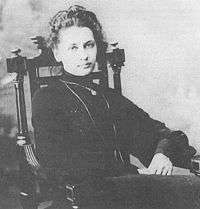Yekaterina Peshkova

Yekaterina Pavlovna Peshkova, née Volzhina (Russian: Екатерина Павловна Пешкова, née Волжина; 26 July 1887 – 26 March 1965) was a Soviet human rights activist and humanitarian, first wife of Maxim Gorky.
Before the October Revolution she took an active part in the work of the Committee for Assistance to Russian Political Prisoners (Комитет помощи русским политкаторжанам) under the leadership of Vera Figner. After 1914 she led the Children's Commission at the Society for Assistance to War Victims. After 1918 she was the major activist of the Moscow Committee of the Political Red Cross.
After 1922, she was chairwoman of the subsequent organisation the Assistance to Political Prisoners (Pompolit, Помощь политическим заключенным, Помполит). She was honoured by an order of the Polish Red Cross for her participation in the exchange of prisoners of war after the Polish-Soviet War.
During the years of Joseph Stalin's political repressions, she was often the only person who actually helped the political prisoners, passing on letters and parcels of food, and advocating the shortening of the jail terms and amnesties. Thousands of Soviet intellectuals owed their lives to her. Among them was Rabbi Yosef Yitzchak Schneersohn, the sixth Rebbe of the Chabad Lubavitch chasidic movement, who was arrested and imprisoned in the Shpalernaya prison in Leningrad. His death sentence was commuted and changed twice. Finally he was released and left the USSR.
According to Victor Serge:
Having won Lenin's confidence she was allowed, during the Red Terror, to found a relief organization for political detainees, of whatever kind; it was tolerated, first by the Cheka, then by the GPU, with a mixture of respect, trust, and hostility. Peshkova was available to manage the amazing moral feat of retaining the trust simultaneously of victims and inquisitors.[1]
References
- ↑ Serge, Victor. Memoirs of a Revolutionary. New York: New York Review Books, 2012 [1963]. Pp. 374.
External links
- (in Russian) Yaroslav Leontiev Dear Ekaterina Pavlovna
- (in Russian) History of Political Red Cross
- The Murder of Maxim Gorky. A Secret Execution by Arkady Vaksberg. (Enigma Books: New York, 2007. ISBN 978-1-929631-62-9.)